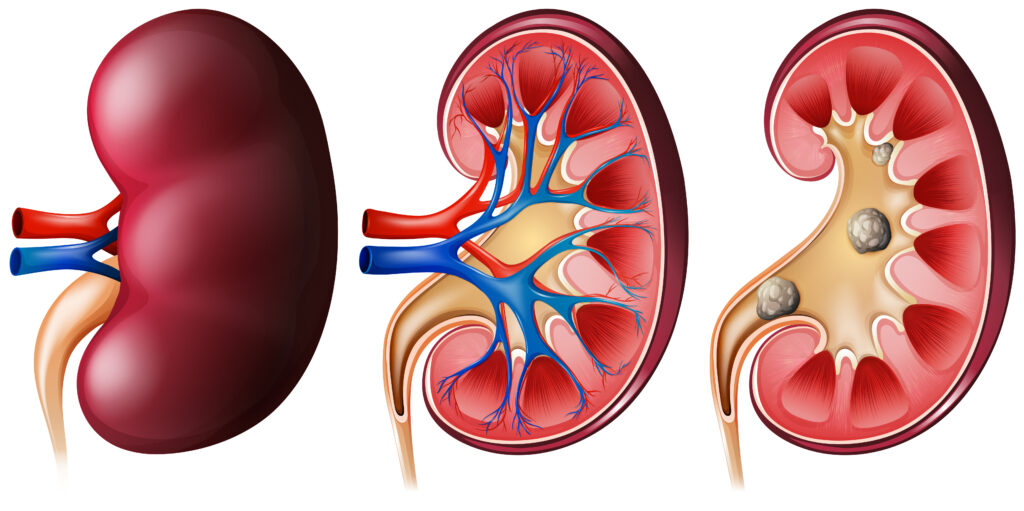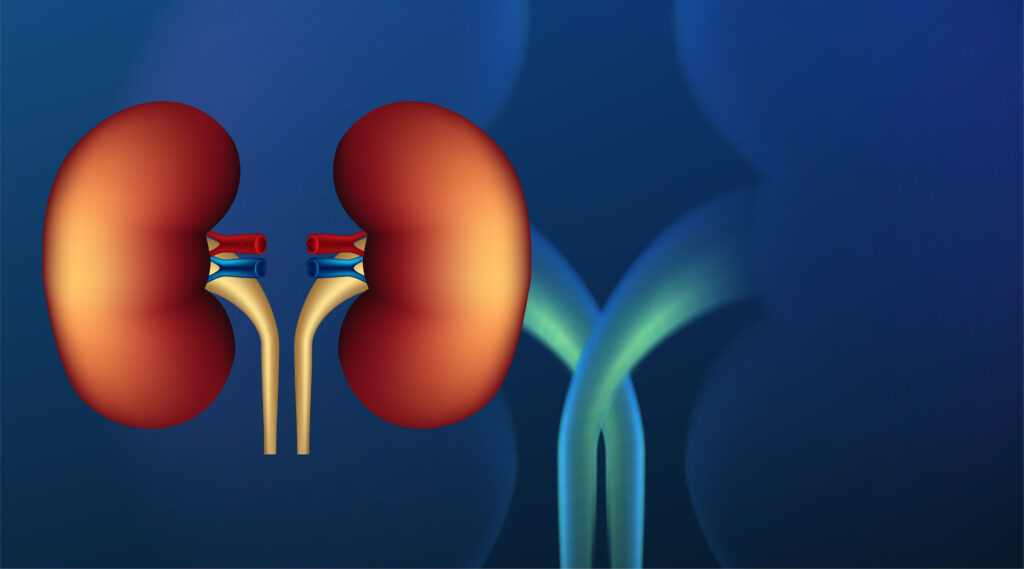What if your body’s silent filter system—your kidneys—suddenly stopped working? No loud alarms, no obvious pain, just a quiet yet rapid buildup of toxins, fluid imbalance, and a health emergency in the making. Fluid imbalance in the kidneys has almost become a health emergency at this point in time. This is what acute renal failure, more scientifically termed acute kidney injury (AKI), is all about.
It can develop within hours to several days, and its onslaught on the organism can be vicious, especially if not medically attended to in a timely manner. Although it can be reversed with medical care, the lives of those who ignore its emergence could also be transformed. In this article, we will explore what acute renal failure is and its symptoms, causes, and treatment options.
What is Acute Renal Failure?

Acute kidney failure will be diagnosed when a patient experiences sudden kidney failure. In medical terminology, it may also be referred to as acute renal failure. It can occur over just a few hours or several days.
Acuteness does not always imply that acute kidney failure will be permanent. If treatment is obtained soon and there are no serious health problems related to acute kidney failure, the normal functioning of the kidneys can usually be restored.
The primary function of the kidneys is to filter waste materials from the blood. They also remove excess fluid from the blood (which is turned into urine) and help maintain blood pressure. The kidneys secrete a hormone that facilitates red blood cell production. Electrolytes, an important type of nutrient, are also regulated by the kidneys, along with the conversion of vitamin D.
Once damaged, the renal function decreases. This could arise due to some pre-existing health conditions, such as diabetes.
Types of acute renal failure
Acute renal failure is classified into three forms based on the origin of the problem:
Pre-renal AKI
This is the cause of decreased perfusion to the kidneys from factors like dehydration, heart failure, or blood loss. The kidneys are morphologically normal but not perfused adequately to function.
Intrinsic (or Intrarenal) AKI
Anything that directly damages kidney tissues, such as inflammation, infection, toxic agents, or ischaemia (a lack of oxygen), will usually cause this. An example is glomerulonephritis or acute tubular necrosis.
Post-Renal AKI
It is a type of failure due to an obstruction in the urinary collecting system such that urine cannot drain. It can be due to issues such as kidney stones, tumours, or enlarged prostate glands.
Difference between acute and chronic
The difference between acute and chronic kidney failure lies in the domains of initiation, duration, and reversibility. Both involve impaired renal function, but the primary distinctions occur in these key areas.
| Features | Acute Kidney Failure (AKI) | Chronic Kidney Disease (CKD) |
| Onset | Sudden (hours to days) | Gradual (months to years) |
| Reversibility | Often reversible with timely treatment | Usually irreversible |
| Duration | Short-term, temporary damage | Long-term, progressive damage |
| Common Causes | Dehydration, infection, medication side effects | Diabetes, hypertension, long-term inflammation |
| Symptoms | Rapid onset of fatigue, swelling, confusion | Often silent until advanced stages |
Stages of Acute Renal Failure
Acute kidney injury is defined and staged according to severity:
First Stage: Mild elevation in serum creatinine and slight reduction in urine output. This is just in the early stages with no or few obvious symptoms.
Second Stage: Moderate increase in serum creatinine and a further decrease in urine production especially noticeable in its symptoms.
Third Stage: Definitely a case of great loss of kidney function with a build-up of wastes in the blood and very less urine production, may need dialysis.
The chances of recovery increase tremendously if intervention is sought at these earlier stages.
Symptoms of Acute Renal Failure
Symptoms may appear suddenly and may be quite differing according to the cause of renal dysfunction and the rate of its decline. Commonly manifested ones may include:
- Decreased urine output or perhaps some may pass urine with normal frequency.
- Swelling of the legs, ankles, or feet from fluid retention.
- Dyspnea.
- Fatigue or confusion.
- Nausea, vomiting.
- Pain or pressure in the chest.
- In very severe attacks, there may even sometimes be seizures or coma.
Patients with these symptoms may not show these symptoms due to their other medical diseases.
What Causes Acute Renal Failure?
Acute kidney injury can arise due to multiple causes such as:
- Severe dehydration or blood loss reducing blood flow to the kidneys
- Overwhelming infections in the body, such as sepsis
- Medications such as NSAIDs and ACE inhibitors, or dyes injected for imaging
- Autoimmune diseases that damage the kidney tissues
- Blockages in the urinary tract from stones, tumors, or enlarged prostate.
All causes have different ways to affect the kidney; hence diagnosis of the specific cause is a necessity for effective management.
Risk Factors
Some people are more likely to develop acute renal failure. Factors that amplify an individual’s risk include:
- Very old age
- Have a history of kidney or liver disease
- Heart failure
- Either diabetes or hypertension
- Hospitalization, especially in intensive care
- Major surgeries, especially those associated with the heart or abdomen
- Nephrotoxic medications or contrast agents.
It is important to know these risk factors for early detection and prevention.
Diagnosis of Acute Renal Failure
A healthcare provider might assess the kidneys using a combination of kidney function tests to diagnose renal failure. They might consider common kidney function tests if they suspect you are likely to progress to renal failure:
Blood tests: Blood tests demonstrate the efficiency of your kidneys in eliminating products of waste from blood. A provider gathers a small sample of blood from a vein in your arm using a very thin needle. The blood sample will be analyzed in the lab.
Urine tests: Urine tests will measure the specific substances in your urine, including protein or blood. You will pee into a special container in your provider’s office or a hospital. Your urine will then be analyzed at the laboratory.
Imaging tests: Imaging tests are utilized to visualize any abnormalities or obstruction in the kidneys and related areas. Imaging tests may include a kidney ultrasound, CT urogram and MRI.
Acute Renal Failure Treatment
The management of acute renal failure includes addressing the underlying cause while a person is supporting and maintaining the kidney function in their healing. If it is detected early, it is possible to recover.
Diet
The doctor recommends limiting workload on the kidneys by limiting sodium and potassium intake. While it tells you to avoid potassium rich fruit or vegetables such as bananas, oranges, or spinach; it mentions eating fruit or vegetables low in potassium, like apples and cauliflower.
Medication
Medication for potassium and phosphate control may ease symptoms but really does not help the kidney heal.
Dialysis
In severe cases, dialysis may be used to filter wastes from blood. This is a temporary measure until some level of recovery occurs or becomes a long-term fix when recovery does not.
Fluid Therapy
Fluid therapy is used in cases of dehydration or blood loss with the aim of restoring blood volume and increasing renal perfusion. Conversely, patients with fluid overload may be diuretics or dialyzed for the purpose of fluid removal. Careful monitoring of fluid balance in both situations is very important to avoid complications.
Preventive Measure and Lifestyle Tips
Even though not everything related to AKI can be avoided, there are some ways to reduce the risk of getting it:
- Proper hydration, most especially during illness or hot weather
- Avoidance of excessive use of NSAIDs or nephrotoxic drugs
- Monitoring and controlling other chronic conditions like diabetes and hypertension
- Routine checks for kidney function if one is of high risk
- Avoid taking medicines on your own without informing your doctor about any supplement or herb you are taking
Do not ignore urinary tract infections or early signs of dehydration; some small problem just might not have become acute failure in the kidneys yet.
Conclusion
Acute renal failure or AKI is the sudden loss of kidney function which can be fatal, if untreated, at times. This condition mostly is reversible by early diagnosis and appropriate intervention, but has negative consequences.
Preventive measures against AKI include optimal management of the underlying conditions, adequate fluid intake, avoidance of nephrotoxic medications and periodic visits to the medical practitioner.
Awareness along with prompt response to the disorder can, moreover, offer benefits for your kidney in overall health.
FAQs
Can acute renal failure be reversed?
Yes, you can reverse acute renal failure as long as it is diagnosed and treated early.
Can acute renal failure lead to permanent kidney damage?
Yes, acute kidney injury (AKI) is able to cause irreversible and permanent damage, if not treated. It can lead to chronic kidney disease and/or total loss of kidney function in severe cases.
How long will it take to recover from AKI?
The recovery interval can vary greatly. Some individuals may recover normal kidney function in a matter of days or weeks; others may take months. In the worst cases, some form of kidney support or dialysis will be required by a patient.



